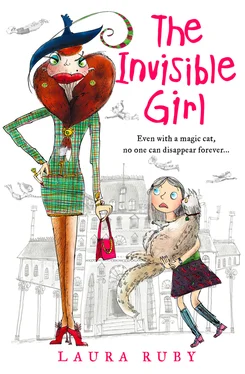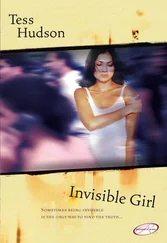Chapter 2 Blue Foot, Blue Foot
RUNNING, RUNNING. SHE WAS RUNNING, the cat curled in her arms, running so hard that her lungs hurt, running until she didn’t feel the pavement beneath her feet any more, until the ground below dropped away and she rose up into the air…
Gurl sat up in bed, clutching her chest. A dream. But not all of it. Not Luigi’s chocolate cake, which she could still smell on her fingertips. Not the cat, who slept across her feet under the threadbare blanket. But what about the rest?
She looked at her hands. They were thin and pale, but they were there , plainly visible. Gurl pulled the covers off her legs. Hands, check. Legs, check. She pulled the covers back up and shivered. The clock on the wall read 5.36am and pinkish sunlight marbled the iron sky outside the windows. The alley had been so much darker. Maybe that was why her hands had looked so strange, why the waiter hadn’t seen her. She had been hidden in dark shadows, odd shadows that mottled her skin.
Yes , she thought. That had to be it.
The cat mewled softly from beneath the blankets and crawled up to sit at Gurl’s side. She wasn’t much to look at. Cats in books had impish black faces and blue eyes, or smushed noses and fur the colour of butterscotch. With a wide, plain face and fur the grey of morning fog, this cat seemed unremarkable in comparison. Except for her eyes, the acid-green eyes that blinked so slowly as Gurl scratched one ear, then the other. The cat rolled over and exposed a white, tufted belly. She put her forepaws in the air and flexed them, clutching at something only she could see.
Gurl scratched the cat’s belly and a strange feeling came over her, a sleepiness, a peacefulness. A musical sort of purring filled Gurl’s ears, erasing the frown that had pulled at her lips. If a tree falls in the forest and there is nobody around, she thought, does it make a sound? If a tree falls…if a tree falls…if a tree falls…
If anyone in the dorm had awakened, they would have thought Gurl had gone into a trance. Time passed, syrup slow, as Gurl scratched and scratched and scratched. Finally, the cat turned her little face to the clock and mewled softly. Gurl shook herself awake and checked the time: 5.57! In three minutes the alarm would ring and all the kids would wake up. What was she going to do with the cat? She couldn’t let anyone see it or else they would take it. Gurl was not very brave, not as brave as she wanted to be, but she was responsible. And if the cat had really chosen her, well then, the cat was Gurl’s responsibility.
Gurl climbed from her bed and pulled a box from underneath it, a box with a couple of old sweaters in the bottom. She reached into her bed, lifted the sleepy animal and laid it gently in the box. The cat peered at Gurl. “I’m sorry,” whispered Gurl, “but I can’t let anyone see you. Can you stay in this box until I can come back?”
The cat circled the box, kneading the sweaters. After curling up in a ball, she reached out with a white paw and rested it on top of Gurl’s hand. “You understand, don’t you?” Gurl breathed. Gurl knew that was a silly thing to think, that the cat was just an animal and couldn’t possibly understand what Gurl was saying. But cats were rare and special, Gurl told herself. Maybe the cat did understand. Gurl gave the cat one last pat and then she closed the box again, hoping that cats liked small spaces and sleeping for hours.
She didn’t have a lot of time to worry about it because soon the alarm rang and the kids climbed from their beds. As usual, no one greeted Gurl, no one asked her if she wanted to sit with them at breakfast. She ate as she always did, in the very back corner of the cafeteria, watching as all the others laughed and talked and shoved one another. It was just as well. Gurl had nothing to say to them anyway. A piece of toast fell lard-side down in front of her, but she ignored it.
“What’s up, Leadfoot?” said a voice. Gurl didn’t have to look to know who it was: Digger.
“Nothing,” Gurl muttered. It was what she always said.
“What? I can’t hear you!” Digger bellowed, getting up from her own table to lumber over to Gurl’s. She was huge, bigger than most of the boys even, with a great square head like a block of wood. She wasn’t much of a flyer, but she didn’t need to be. Once a brick had come loose from the second storey of the dormitory building. It had fallen on Digger’s foot while she was playing killer ball in the yard. She’d turned and proceeded to kick the wall so hard that some of the other bricks came loose. “Nobody messes with me,” she said. “Not even the buildings.”
Digger was tough, the toughest actually. The only thing that wasn’t tough was the way she picked her nose: delicately, with the tip of her pinky extended like she was sipping tea from fine china.
Gurl pushed her eggs around her plate, wondering if Digger would flip them on the floor or in her lap. Not that it mattered, for the eggs smelled like sweaty socks stuffed with day-old fish and were the last things in the world Gurl wanted to eat.
Digger snatched the fork from her hand and smacked Gurl’s plate to the floor, the eggs pellets scattering. “I said, I can’t hear you! Speak, Freak!”
Gurl finally looked up into that big blockhead face. Digger’s expression was the same as the waiter’s had been: smug and triumphant. It was like she knew that Gurl was beaten already, doomed before she began. Gurl thought of what she had done to the waiter, and a tiny smile made her lips curl up at the corners.
Digger’s nostrils flared. “Look at you,” she said. “You’re pathetic. All you do is sit there like a lump and stare at everyone.” With her knuckles, Digger rapped painfully on Gurl’s skull. “Hello, Lump. Is anyone in there?”
For a moment, Gurl wished she could disappear. Wouldn’t that be amazing? Then what would Digger do?
But her hands and legs and the rest of her stayed exactly the way they were and even Digger grew bored. “Freak,” she muttered and went to find someone more interesting to torment.
A word about Hope House: there are places in the world where so many desperate people have lived and so many bad things have happened that the places themselves have become desperately bad. They’re damp and weird and smell like foot fungus. The windows are never clean and the lino curls up at the edges because it can’t stand the floor. Every corner is sprayed with cobwebs and quivering shadows. When you walk into these bad places, you can feel a headache brewing between your eyebrows, a churning in your gut, a cold prickle at the back of your neck. You feel sad and angry and helpless, all at the same time. These bad places seem to hate you, but they also seem to want to keep you there very, very much.
Hope House for the Homeless and Hopeless was one of these places. But, as Gurl had learned in her history lessons, Hope House for the Homeless and Hopeless had not always been called Hope House for the Homeless and Hopeless. Back in the early 1800s, when it was first built, it was called The Asylum For The Poor, The Lazy and The Wretched, and its mission was “to teach idle, wild and disobedient children self-discipline of the body and soul”. After that the name was changed again, to The Home of the Friendless—“for unprotected children whose only crime is poverty”. And then for a while it was called The Institute of the Destitute, which offered orphans job training in such occupations as sheep shearing, basket weaving and flower arranging.
Despite the various name changes, the mission was generally the same: keep homeless kids out of trouble and try to teach them something useful. To that end, in literature class the orphans of Hope House were again composing business letters to rich people urging them to join the Hope House “Adopt-an-Orphan” programme, in which a donation of just $7.50 a day—only the price of a double latte!—would keep an orphan fed for a year. In art they made Hope House oven gloves and place mats, which were sold for $14.95 plus $5.99 shipping and handling on the orphanage website. In computer class they learned how to send emails to thousands of people at a time, with subject lines like “Don’t let hope die at Hope House!” or “The truest heart gives until it hurts!”
Читать дальше












